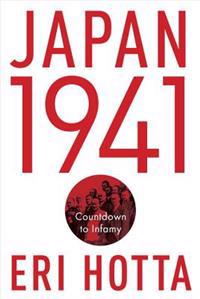Japan 1941: Countdown to Infamy (Inbunden)
avEri Hotta
ISBN: 9780307594013 - UTGIVEN: 2013-10A groundbreaking history that considers the attack on Pearl Harbor from the Japanese perspective and is certain to revolutionize how we think of the war in the Pacific.
When Japan launched hostilities against the United States in 1941, argues Eri Hotta, its leaders, in large part, understood th[...]Japan 1941: Countdown to Infamy (Häftad)
avEri Hotta
ISBN: 9780307739742 - UTGIVEN: 2014-08A "Kirkus Reviews" Best Nonfiction Book of the Year
A groundbreaking history that considers the attack on Pearl Harbor from the Japanese perspective and is certain to revolutionize how we think of the war in the Pacific.
When Japan attacked the United States in 1941, its leaders, in large pa[...]Pan-Asianism and Japan's War 1931-1945 (Pocket)
avEri Hotta
ISBN: 9781137270351 - UTGIVEN: 2013-04-04The book explores the critical importance of Pan-Asianism in Japanese imperialism. Pan-Asianism was a cultural as well as political ideology that promoted Asian unity and recognition. The focus is on Pan-Asianism as a propeller behind Japan's expansionist policies from the Manchurian Incident until [...]
Japan 1941: Countdown to Infamy (CD-bok)
avEri Hotta, Laural Merlington
ISBN: 9781452616773 - UTGIVEN: 2013-10When Japan attacked the United States in 1941, argues Eri Hotta, its leaders, in large part, understood they were entering a conflict they were bound to lose. Availing herself of rarely consulted material, Hotta poses essential questions overlooked by historians in the seventy years since: Why did t[...]
Japan 1941: Countdown to Infamy (Övrigt)
avEri Hotta, Laural Merlington
ISBN: 9781452666778 - UTGIVEN: 2013-10When Japan attacked the United States in 1941, argues Eri Hotta, its leaders, in large part, understood they were entering a conflict they were bound to lose. Availing herself of rarely consulted material, Hotta poses essential questions overlooked by historians in the seventy years since: Why did t[...]







